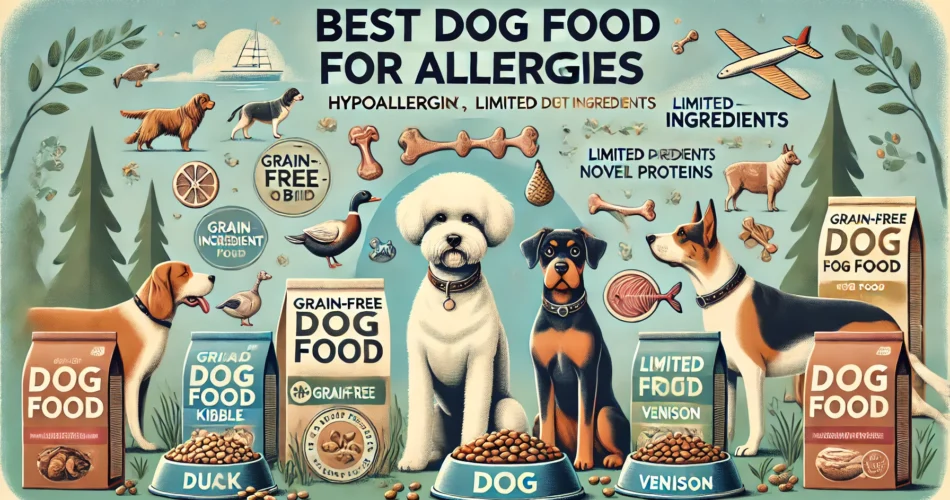Does your furry friend suffer from allergies? Seeing your dog itch, scratch, or struggle with digestive issues can be heart-wrenching. Just like humans, dogs can have food allergies that impact their quality of life. Finding the best dog food for allergies can be a game-changer, helping to soothe your pet’s symptoms and bring them back to their playful, happy self. In this guide, we’ll explore the best options available, answer common questions, and provide you with valuable insights to make the right choice for your canine companion.
Understanding Dog Food Allergies
Before diving into the best food options, it’s essential to understand what food allergies in dogs are. Food allergies occur when your dog’s immune system mistakenly identifies a particular ingredient as harmful, triggering an allergic reaction. Common symptoms include:
- Itchy Skin: Persistent scratching, especially around the ears, paws, and belly.
- Digestive Issues: Vomiting, diarrhea, or gas.
- Chronic Ear Infections: Recurring ear issues are often linked to food allergies.
- Red, Inflamed Skin: Hives or hot spots can appear.
Common Allergens in Dog Food
Many dog foods contain ingredients that could trigger allergies. Some of the most common allergens include:
- Beef
- Dairy Products
- Chicken
- Wheat
- Soy
- Eggs
These ingredients are commonly found in commercial dog foods, making it challenging to pinpoint the cause of your dog’s allergy. Identifying and eliminating the offending ingredient is crucial in managing food allergies.
How to Choose the Best Dog Food for Allergies
When searching for the best dog food for allergies, consider the following:
- Limited Ingredient Diets (LID): These foods are formulated with minimal ingredients, reducing the risk of allergens.
- Hypoallergenic Dog Foods: Often prescribed by veterinarians, hypoallergenic diets are made with hydrolyzed proteins that are easier for dogs to digest.
- Grain-Free Options: Some dogs are sensitive to grains; choosing grain-free formulas can alleviate allergy symptoms.
- Novel Protein Diets: Proteins like venison, duck, or kangaroo are less likely to trigger allergies since they are not commonly used in dog foods.
Top Picks: Best Dog Food for Allergies
Here are some of the top-rated dog foods specifically designed for dogs with allergies:
1. Hill’s Prescription Diet z/d Skin/Food Sensitivities
Hill’s z/d is a veterinary-prescribed hypoallergenic food designed for dogs with severe food allergies. It uses hydrolyzed proteins, which are broken down to a size that is unlikely to trigger an allergic reaction.
- Pros: Clinically tested, excellent for severe allergies, supports skin and coat health.
- Cons: Expensive and requires a veterinary prescription.
2. Blue Buffalo Basics Limited Ingredient Diet
Blue Buffalo Basics offers a range of limited-ingredient formulas with high-quality proteins such as turkey and salmon. It’s an excellent choice for dogs with food sensitivities.
- Pros: No artificial preservatives, grain-free, supports digestive health.
- Cons: May not be suitable for extremely sensitive dogs.
3. Natural Balance L.I.D. Limited Ingredient Diets
Natural Balance L.I.D. dog foods are crafted with a simple list of ingredients, focusing on a single protein source and minimal fillers. This brand is well-known for quality and consistency.
- Pros: Affordable, easily accessible, no corn, wheat, or soy.
- Cons: Some flavors may not be as palatable to picky eaters.
4. Royal Canin Veterinary Diet Hydrolyzed Protein
This veterinary-prescribed diet is perfect for dogs with multiple allergies. The hydrolyzed protein formula is designed to prevent allergic reactions and support healthy digestion.
- Pros: Highly digestible, balanced nutrition, excellent for skin and coat health.
- Cons: Prescription required, premium price.
5. Canidae PURE Limited Ingredient Grain-Free Premium Dry Dog Food
Canidae PURE offers a range of grain-free, limited-ingredient dog foods with high-quality proteins and simple ingredients. It’s ideal for dogs with food allergies and sensitive stomachs.
- Pros: Wide variety of protein options, grain-free, suitable for all life stages.
- Cons: Higher price point compared to standard dog foods.
Tips for Managing Your Dog’s Food Allergies
- Consult Your Veterinarian: Always consult your vet before switching to a new diet. They can guide you through elimination diets and recommend the best food for your pet.
- Transition Slowly: When introducing a new food, transition slowly over 7-10 days to avoid digestive upset.
- Read Labels Carefully: Look for foods with simple, recognizable ingredients. Avoid those with fillers, artificial preservatives, and common allergens.
- Monitor Your Dog’s Reaction: Keep an eye on your dog’s symptoms. If allergies persist, further testing may be necessary.
Choosing the best dog food for allergies can significantly improve your dog’s quality of life, reducing discomfort and boosting overall health. From limited ingredient diets to hypoallergenic options, there’s a solution out there that will work for your pup. Remember, every dog is unique, so what works for one may not work for another. Start with a consultation with your veterinarian and explore the options that best suit your furry friend’s needs.




